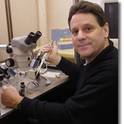| Present | Director, Massachusetts Pesticide Analysis Laboratory, University of Massachusetts Amherst | |
|
|
||
| Present | Professor, Department of Veterinary and Animal Sciences, College of Natural Sciences, University of Massachusetts Amherst | |
|
|
||
Disciplines
Research Interests
Honors and Awards
- American Chemical Society Award in Aerochemicals, 2004
Courses
- EnvSci 191
- EnvSci 194
- EnvSci 315
- EnvSci 535
- Envsci 585
- Envsci 592
Contact Information
Morrill I N311A
637 North Pleasant Street
University of Massachusetts Amherst
Amherst, MA 01003
Tel: 413-545-1052
